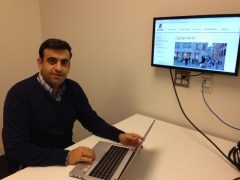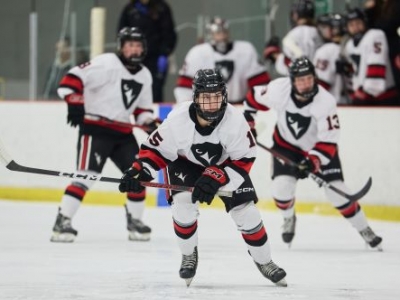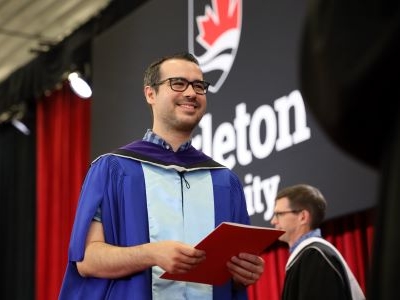This story was published originally on the Mitacs website on April 15, 2015. You can find the original story by clicking here.
 In our increasingly connected world, cell phone and Wi-Fi systems have to be well designed and able to handle traffic. Through Mitacs Elevate, postdoctoral fellow Hassan Halabian is working with industry to make these systems better at serving consumers and businesses.
In our increasingly connected world, cell phone and Wi-Fi systems have to be well designed and able to handle traffic. Through Mitacs Elevate, postdoctoral fellow Hassan Halabian is working with industry to make these systems better at serving consumers and businesses.
As a PhD student in the Department of Systems and Computer Engineering at Ottawa’s Carleton University, Hassan’s research focused on the efficiency of wireless systems — finding newer and better ways to control how cellular and Wi-Fi systems allocate network resources optimally.
In 2012, he received a Mitacs Elevate fellowship, which allowed him to continue his research before going on to gain practical experience at tech giant Ericsson. That extra year at Carleton saw Hassan discover new ways to reduce the power consumption of wireless networks, while improving their performance.
“This means customers can have faster wireless internet access with fewer delays, and use less of their cell’s battery power,” says Hassan. “For cellular providers, their systems can handle more customers, and give people a better experience.”
Later, at Ericsson, Hassan joined the Wi-Fi System Design team, investigating ways to further develop carrier-grade Wi-Fi — a system allowing wireless companies to route data traffic from cellular bands onto Wi-Fi. The team needed to give Wi-Fi systems higher performance and reliability, and figure out how to give cell networks the ability to automatically choose which data to switch over to Wi-Fi.
“This would give consumers better voice quality on their cell phone calls, faster downloading, and better video streaming,” says Hassan. “In areas with good Wi-Fi, they’d also have better coverage if cell connections are bad. For cell companies, offloading calls onto Wi-Fi networks would save money because Wi-Fi’s bandwidth is unlicensed. It would also let them handle more customers on their networks.”
Meanwhile, Ericsson also added Hassan to a group collaborating with other tech companies to develop new global compatibility standards for Wi-Fi networks. He’s now employed with the company full-time.
“Many companies hire people with working experience, but few PhDs have it,” says Ericsson Systems Engineer Roland Smith. “Bringing them in on postdoctoral fellowships like the ones provided by Mitacs helps give them that experience, while we get someone with a fresh perspective.”
Hassan echoes that sentiment. “You don’t want to do research that no-one wants or needs. It’s important for academics doing theoretical research to produce the knowledge needed by industries and consumers in Canada.”
________________________________________
Mitacs gratefully acknowledges Western Economic Diversification, the Atlantic Canada Opportunities Agency and the governments of Alberta, British Columbia, Manitoba, and New Brunswick for their support of Mitacs Elevate. In addition, select Elevate fellows are supported through Mitacs Accelerate and its funding partners.
Thursday, April 16, 2015 in Alumni, Grad Student Research, News
Share: Twitter, Facebook





